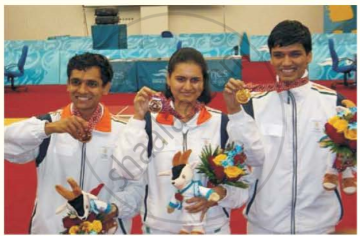Advertisements
Advertisements
प्रश्न
Read the extract given below and answer the questions that follow :
Giles: I beg your pardon. Did you say something?
Trotter: Yes, Mr. Ralston, I said ‘Is there an extension ?’ (He crosses to Centre.)
Giles: Yes, up in our bedroom.
Trotter: Go and try it up there for me, will you?
(Giles exits to the stairs, carrying the glove and bus ticket and looking dazed. Trotter continues to trace the wire to the window. He pulls back the curtain and opens the window, trying to follow the wire. He crosses to the arch up Right, goes out and returns with a torch. He moves to the window, jumps out and bends down, looking, then disappears out of sight. It is practically dark. Mrs. Boyle enters from the library up Left, shivers and notices the open window.)
Mrs Boyle: (Moving to the window) Who has left this window open?
(i) Why did Giles fail to hear what Trotter had said earlier·? Why did Giles look 'dazed'?
(ii) What was Trotter attempting to do? Why?
(iii) Why did Mrs. Boyle close the window? What did tl1e voice on the radio say about the 'mechanics of fear'?
(iv) How did the murderer mask the sounds of the killing? Who entered the room immediately after the murder? What did this person see?
(v) Who was the victim? Why was the victim murdered? What was the 'signature tune' that the murderer whistled? What is the significance of this tune in the context of the play?
उत्तर
(i) Giles had just found a London bus ticket from Mollie’s glove. He was feeling upset and confused due to this. That is why he failed to hear what Trotter had said earlier. He looked dazed because he could not understand why the London bus ticket was there in Mollie’s glove when she had not gone there.
(ii) Trotter was trying to find out if the telephone wire had been cut by someone or it had simply gone out of order due to the snowstorm that had blown the other day. In fact, he wanted to make a report to Police Superintendent Hogben. That is why he needed telephone service.
(iii) Mrs. Boyle closes the window because a very cold wind is blowing. She shivers due to this cold wind. The voice on the radio says that in order to understand the mechanics of fear you have to study the exact effect produced by fear on the human mind. If one is alone in a room, in the late afternoon and door opens softly behind him/her, he/she is likely to be frightened.
(iv) The murderer masked the sounds of the killing under the tune of ‘Three Blind Mice’. Soon after the murder, Mollie entered the room. She switched on the light and saw Mrs. Boyle lying strangulated in front of the sofa.
(v) The victim was Mrs. Boyle. The victim was murdered because she was one of the Judges on the bench which sent the three children to the Long ridge. The farm where they were cruelly treated and one of them died. The murderer whistled the tune of ‘Three Blind Mice’. The tune of ‘Three Blind Mice’ is a significant lure because ‘The mousetrap’ is a revenge play and here one of the ill-treated children George is going to take revenge from his victim. So the tune is very significant here.
APPEARS IN
संबंधित प्रश्न
Avik, a correspondent for his school magazine, interviews Grandmaster Koneru Bumpy. Let us read :
INTERVIEW WITH KONERU BUMPY
Avik : Good morning, Ma'am! Congratulations on your achievements in the World Grand Prix Women's Chess Championship in Istanbul recently!

Koneru Humpy : Thank you! This is my biggest win in the women's circuit. This is very significant, considering that it has come in an event which had three former world champions.
Avik : Indeed! Please tell us something about yourself, Ma' am!
Koneru Humpy : I was born in Gudivada, near Vijaywada, in Andhra Pradesh on March 31, 1987. I was originally named 'Humpi' {which means champion) by my father Mr Koneru Ashok, who later changed the spelling to Humpy, to give the nrune a Russian flavour. I write my family name , Koneru, before my given name, as is the convention with the Telugu speaking people. I started playing chess when I was 5 years old.
Avik : Who introduced you to the game?
Koneru Humpy : My father acquainted me with the game. He is also my first coach. I first showed interest at the age of 6 years, when I watched him play a game and suggested a move. Indeed it was the move that actually got me into the game.
Avik : Your father left his teaching profession to make you a champion !
Koneru Bumpy : Yes, when I took the 4th place in the Indian Under 8 Championship in 1995, he decided to leave his career and dedicate his time to me.
Avik : And you had won four World Championship at a very early stage.
Koneru Bumpy : Yes, the World Girl Under 10, the World Girls Under 12, the World Girls Under 14 and World Girls Junior Chrunpionships. I acquired my IM title in 1999 and in May 2002, I achieved my 3rd GM Norms in Elekes Memorial Grandmaster Tournrunent in Budapest.
Avik : You held the record from 2002 to 2008 for the youngest woman ever to become a grandmaster!
Koneru Bumpy : Yes, I achieved it at the age of 15 years, 1 month, 27 days, beating Judit Polgar's previous record by 3 months; which was later lost in the Women's World Chess Championship in 2008 to Hou Yifan. I won the World Junior Girls Chess Championship in 2001 and won the edition or North Urals Cup, the Women's Super Tournrunent held in Krasnoturinsk. In 2006, I participated in the Women's World Chess Chrunpionship, but my crunpaign had to end early in the second round. I played in the first board of Monte Carlo Chess Club and won the last two editions of the European Club Cup.
Avik : You have got some awards also !
Koneru Humpy : Yes, Arjuna Award in 2003, Padmashri Award in 2007 and Raja-Lakshmi Award in 2008.

Avik : In India, many young chess players are ready to take a break in education and are fully focussed on chess preparations. What are your views?
Koneru Humpy : I don't think that taking up chess as a career and completely neglecting studies will be necessary at an earlier stage. After getting to a certain level in the game, they themselves should decide their preferences i.e. whether to play seriously or not.
Avik : What advice would you offer to parents of enthusiastic and talented chess children?
Koneru Humpy : Parents should not compel children to play chess. If children are genuinely interested in the game, they should encourage them. But they shouldn't hurry to get results.

Avik : How often do you exercise? Do you think daily physical exercise can help a chess player to cope with the pressure and increase the brain's ability to concentrate?

Koneru Humpy : I spend around one hour per day on physical exercise. Exercise is a must for every chess player. As the proverb says, 'a sound mind in a sound body'. Exercise shows a lot of impact on the brain.
Avik : Thank you for talking to me and giving valuable advice.
Koneru Humpy : Thank you.
What does he plant who plants a tree? a
He plants a friend of sun and sky;b
He plants the flag of breezes free;
The shaft of beauty, towering high;
He plants a home to heaven anigh;
For song and mother-croon of bird
In hushed and happy twilight heard____
The treble of heaven's harmony_____
These things he plants who plants a tree.
Read the lines given above and answer the question that follow:
What does he plant who plants a tree?
He plants, in sap and leaf and wood,
In love of home and loyalty
And far-cast thought of civic good____
His blessing on the neighbourhood,
Who in the hollow of his hand
Holds all the growth of all our land____
A nation's growth from sea to sea
Stirs in his heart who plants a tree.
Read the lines given above and answer the question that follow:
What motivates the man to plant a tree according to the poet?
"My father lived at Blenheim then,
Yon little stream hard by;
They burnt his dwelling to the ground,
And he was forced to fly;
So with his wife and child he fled,
Nor had he where to rest his head.
"With fire and sword the country round
Was wasted far and wide,
And many a childing mother then,
And new-born baby died;
But things like that, you know, must be
At every famous victory;
Read the lines given above and answer the question that follow.
Explain the lines:
“With fire and sword the country round
Was wasted far and wide,’
After considering the matter, and talking it over with his wife, farmer Jones said that he would take John, and do well by him, now that his mother was out of the way; and Mrs. Ellis, who had been looking out for a bound girl, concluded that it would be charitable in her to make choice of Katy, even though she was too young to be of much use for several years.
“I could do much better, I know,” said Mrs. Ellis; “but as no one seems inclined to take her, I must act from a sense of duty expect to have trouble with the child; for she’s an undisciplined thing—used to having her own way.”
But no one said “I’ll take Maggie.” Pitying glances were cast on her wan and wasted form and thoughts were troubled on her account. Mothers brought cast-off garments and, removing her soiled and ragged clothes, dressed her in clean attire. The sad eyes and patient face of the little one touched many hearts, and even knocked at them for entrance. But none opened to take her in. Who wanted a bed-ridden child?
“Take her to the poorhouse,” said a rough man, of whom the question “What’s to be done with Maggie?” was asked. “Nobody’s going to be bothered with her.”
“The poorhouse is a sad place for a sick and helpless child,” answered one.
“For your child or mine,” said the other, lightly speaking; “but for tis brat it will prove a blessed change, she will be kept clean, have healthy food, and be doctored, which is more than can be said of her past condition.”
Read the extract given below and answer the question that follow.
What solution did the rough man suggest for Maggie? Why would the poorhouse be a good place for Maggie?
Why did Dancy's friends wish him to take legal action against De Levis ? What reasons did Dancy give for not wanting to do so ?
Why was Tansen afraid of singing Raga Deepak?
Multiple Choice Question:
A house becomes a home with ________
Speak the following sentences clearly but as quickly as you can learn them by heart.
1. How much wood would a woodchuck chuck if a woodchuck would chuck wood.
2. Betty bought a bit of butter, but the bit of butter was a little bitter so she bought some better butter to make the bitter butter better.
Referring closely, to Act III Scene III, relate the stern warning of Ariel to the "three men of sin". What impact does his warning have on the three sinners?
